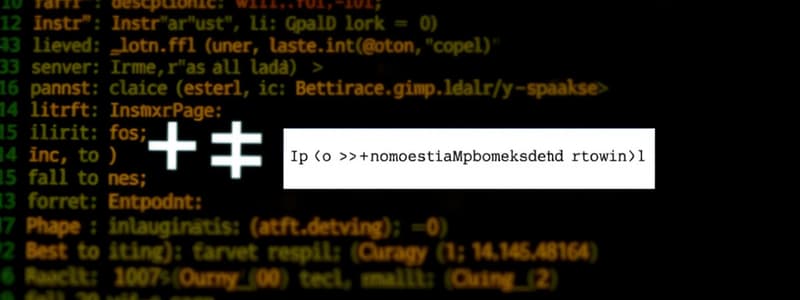Podcast
Questions and Answers
Run-time type information can be used to determine:
Run-time type information can be used to determine:
An object's type.
The ________ operator returns a reference to a ________ object:
The ________ operator returns a reference to a ________ object:
typeid, type_info
Flashcards are hidden until you start studying
Study Notes
Compilation Errors and Abstract Classes
- Assigning a base-class object address to a derived-class pointer results in a compilation error.
- Objects of abstract classes cannot be instantiated.
- Abstract classes may have multiple pure virtual functions, but cannot have zero references.
Virtual Functions and Polymorphism
- A pure virtual function lacks an implementation, distinguishing it from regular virtual functions.
- Polymorphism is enabled by virtual functions and dynamic binding, allowing for flexible function calls.
- Downcasting turns a base-class pointer into a derived-class pointer, essential for polymorphic behavior.
Class Definitions and Characteristics
- Abstract classes are defined with the intention of not instantiating their objects.
- Concrete classes inherit virtual functions but maintain pointers to their base classes' virtual functions if they do not override them.
- A class containing a pure virtual function becomes an abstract class, which cannot instantiate objects.
Inheritance and Implementation
- Virtual functions must be declared as virtual in base classes and can be accessed using the dot operator.
- A shape without pure virtual functions cannot be considered an abstract class.
- Derived classes must override virtual functions to achieve polymorphic behavior.
Runtime Type Information
- Runtime type information (RTTI) identifies an object’s type during execution.
- The
typeidoperator yields a reference to thetype_infoobject, essential for type checking.
Memory Management and Use of Destructors
- Virtual destructors ensure proper resource management when deleting derived-class objects via base-class pointers.
- Classes utilizing virtual functions typically occupy more memory due to additional overhead.
C++11 Base Classes and Function Requirements
- In C++11, only classes that are not marked as final can serve as base classes.
- Virtual functions do not need to be overridden in derived classes, but they must be declared virtual in the base class.
- The presence of a virtual function does not guarantee that all derived classes will implement it.
Class Functionality and Object Types
- To effectively deal with objects of various types without specific case handling, polymorphism allows function calls to vary based on object type.
- The failure to implement separate handling for different object types can complicate program maintenance and updates.
Studying That Suits You
Use AI to generate personalized quizzes and flashcards to suit your learning preferences.




